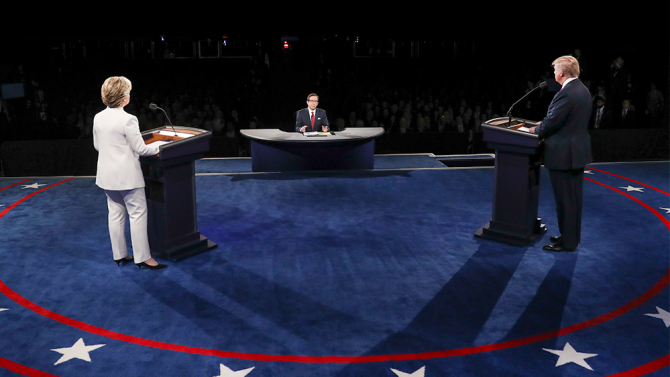A Recap of the Final Presidential Debate
Wednesday night, the 2016 presidential campaigns converged on the University of Nevada in Las Vegas for the final debate between Hillary Clinton and Donald Trump before voters head to the polls on November 8th. For Trump, this debate was an opportunity to give voters a chance to see him in a presidential light versus the boisterous, uncensored candidate the GOP has been forced to play nice with. However, Trump was unable to come off as anything other than a loose cannon who is easily ignited by the mere thought of being anything but a winner.
At the beginning of the debate, Trump was low energy and it was apparent his lagging in the polls and the election is taking its toll on him. Trump worked hard to stay on message and it came off robotic and extremely unnatural.
Hillary, on the other hand, looked refreshed, calm, collected, and presidential. There were moments when she became visibly agitated, for example, when Chris Wallace brought up the Wikileaks document about Clinton’s desire for open borders, and, in true Clinton fashion, she quickly changed the subject to criticize both Russia and WikiLeaks for trying to influence the election. However, even this did not seem to rattle her and Clinton maintained her composure.
Unfortunately, the same could not be said for Trump. Clinton baited him until he bit and went off script. As the debate wore on, Trump became more short-tempered and terse. Up until this election, presidential debates were used to give voters a chance to learn more about each candidate and their stance on the issues. As an outlier, this election has turned presidential debates into a spectacle, rivaling even the most drama-filled reality tv shows.
It came as no surprise on Wednesday night, when Trump told moderator Chris Wallace, “What I’m saying, I will tell you at the time, I will keep you in suspense” when asked if he would concede should the election results show he lost. This coy remark was the defining moment of the debate and is easily the stuff of voter nightmares. After plummeting in the polls, Trump has taken aim at the media and the electoral process telling anyone who will listen that the system is rigged. For those who remember the 2000 recount, Trump’s cries of a rigged system have people facepalming over a scenario of Trump not conceding should he in fact lose on November 8th.
As an irrational actor in this electoral process, Trump’s unpredictability throughout this cycle has caused strategists to throw out the playbook on what a text book campaign looks and operates like and, instead, they’re blindly throwing darts at the wall with the hope of hitting something. Trump’s threatening not to accept defeat has the potential to extend the 2016 election beyond November 8th.
Another issue with Trump refusing to give voters the peace of mind on his willingness to lose is the possibility of his supporters never fully accepting Clinton as the winner. Mark Braden, former chief counsel of the Republican National Committee, explains that the two most important things about the outcome of an election are, “the winners win and the losers lose ” and “the rational people that support the loser believes [sic] that the winner won.”
As America heads into the final weeks of the 2016 election, it is only fair to brace for impact, because, according to my Magic 8 Ball, the chances of Trump accepting defeat graciously are not so good.
Originally written for and published on Political Storm

